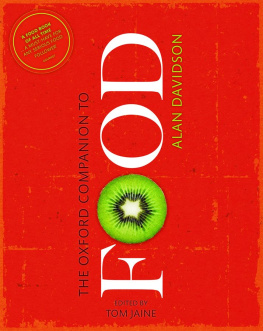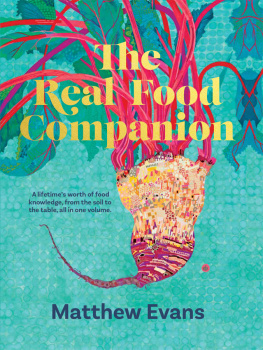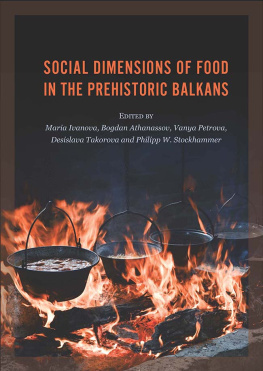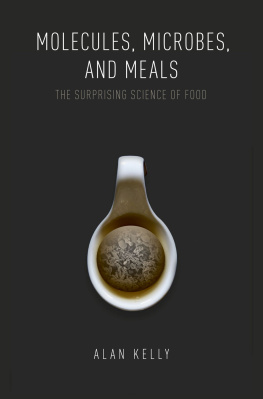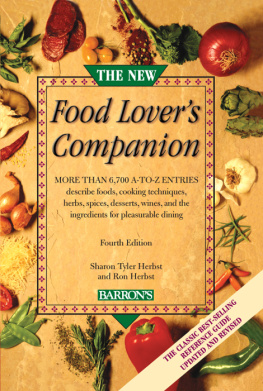While most e-readers can display special characters (such as and ), many cannot search for words containing them unless the special characters themselves are typed into the search box. If you are unable to type these characters, please browse for your term using the .
The Oxford Companion to
FOOD
Alan Davidson
Third edition edited
by Tom Jaine
Illustrations by
Soun Vannithone


Great Clarendon Street, Oxford, ox2 6dp,
United Kingdom
Oxford University Press is a department of the University of Oxford.
It furthers the Universitys objective of excellence in research, scholarship,
and education by publishing worldwide. Oxford is a registered trade mark of
Oxford University Press in the UK and in certain other countries
the Estate of Alan Davidson 1999, 2006, 2014
in the Editors contribution to the second and third editions, Oxford University Press 2006, 2014
Illustrations (except those indicated in Picture Acknowledgements) Soun Vannithone
The moral rights of the author have been asserted
First edition published 1999
Second edition published 2006
Third edition published 2014
All rights reserved. No part of this publication may be reproduced, stored in
a retrieval system, or transmitted, in any form or by any means, without the
prior permission in writing of Oxford University Press, or as expressly permitted
by law, by licence or under terms agreed with the appropriate reprographics
rights organization. Enquiries concerning reproduction outside the scope of the
above should be sent to the Rights Department, Oxford University Press, at the
address above
You must not circulate this work in any other form
and you must impose this same condition on any acquirer
Published in the United States of America by Oxford University Press
198 Madison Avenue, New York, NY 10016, United States of America
British Library Cataloguing in Publication Data
Data available
Library of Congress Control Number: 2013957569
ISBN 9780199677337
ebook ISBN 9780191040726
Readers of this revised edition of The Oxford Companion to Food may know little of the author of the vast majority of its entries, Alan Davidson . Alan died in 2003 ; not before making plans of his own for improvements and alterations to his book but, sadly, with little time to implement them.
Alan was born in 1924 , the son of an inspector of taxes and proud of his Scottish forebears. He was educated at Leeds Grammar School and Queens College, Oxford, where he took a double first in classics. His time at university was interrupted by military service in the Royal Navy RNVR, first as an ordinary seaman, later a lieutenant, in the Pacific, the North Atlantic, and the Mediterranean. He somewhat shamefacedly recalled slicing a whale in two when officer of the watch aboard the aircraft carrier Formidable. Left-hand down a bit, doesnt work with large boats at full bore. Perhaps his fish books were a penance for this accident.
A man of his qualifications was a perfect match for the Foreign Office which he joined once down from Oxford in 1948 . His career path took in Washington, The Hague, Cairo, Tunis, Brussels (where he was Head of Chancery of the British Delegation to NATO), and, finally, Laos, to which he was Ambassador 19735 .
From the outset of adult life, Alan had written for pleasure and very occasional profit. His earliest squibs were humorous, some published in Punch magazine, and of course his diplomatic life allowed full rein to the composition of graceful, if formal, memoranda and reports. During his stay as Head of Chancery to the British Mission in Tunis in 1961 , however, his wife Jane found herself understandably muddled by the various names proffered for one sort of fish or another in the local markets and he promised to compile a list. Even an Oxford man cannot summon such knowledge out of the ether and he was fortunate in the arrival of the Italian Professor Georgio Bini , the worlds greatest living authority on seafish in the Mediterranean, as part of an official delegation to discuss the irrepressible dynamiting of their catch by Sicilian fishermen in the Gulf of Tunis: a method more rapid than discerning. As the negotiations were long and largely political, Bini (no politician) was able to instruct Alan in elementary ichthyology. Out of these lessons, Seafish of Tunisia and the Central Mediterranean was born. Published by Alan himself in 1963 , it was shortly followed by Snakes and Scorpions Found in the Land of Tunisia . At that stage, his passion seemed to be for taxonomy, not fish dinners.
A colleague who had known the food writer Elizabeth David when she was working in wartime Cairo sent her a copy of the fish book which she reviewed in her column for the weekly magazine the Spectator . From this first contact flowed the process of its conversion from pamphlet to the full-blown work Mediterranean Seafood published by Penguin Books in 1972 . This quite brilliant book combined the accurate physical description of fish and shellfish with notes of their various names in countries and localities all round the Mediterranean and recipes drawn from friends, family, diplomatic contacts, and well-reputed cookery books (often locally published and unknown to a British readership). The most important ingredients in this heady mix were a light touch, an impish humour, and a perfectly balanced, yet formal style of writing. It has remained in print ever since first appearing.
Alans first book was followed by two more in the same vein: Seafood of South East Asia in 1976 and North Atlantic Seafood in 1979 . Meanwhile, his posting to Laos had permitted him to write Fish and Fish Dishes of Laos in 1975 and to begin work on Traditional Recipes of Laos , published in 1981 .
The success of Mediterranean Seafood and a growing impatience with the formalities of diplomacy caused Alan to retire early from the Foreign Office in 1976 and turn to full-time writing with a particular interest in food. It was at this juncture that he approached the Oxford University Press with the scheme for this volume. Once contracts had been exchanged, the work would occupy him for the next twenty years. He recorded its completion in a gesture typical of his sense of fun: Alan and Jane Davidson announce with great pleasure the safe delivery of The Oxford Companion to Food to the Oxford University Press at 1055 on Tuesday 21 July 1998 . Days overdue: 5674. Weight on delivery: 3 oz [it was, of course, a computer disc].
Reasons for the long gestation of the book were many. It was more ambitious than most such works, for it not only took in the description of a multiplicity of foodstuffs, but tackled the history of food and eating habits in many countries as well as surveying cookery literature and discussing in some detail aspects of food and dietary science. All the while, Alan was pursuing other strands of his career. He was writing books and articles and, more importantly perhaps, he was publishing them under his own imprint of Prospect Books. He founded the company, in partnership with his wife, to allow the publication of a food studies journal Petits Propos Culinaires as well as to reprint important early English cookery books and issue new titles about unfamiliar foodways.

